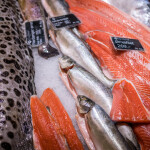The following op-ed was submitted by the Sustainable Fisheries Partnership.
Recently, Carrefour announced its national outlets will stop selling pangasius, citing concerns about pollution from Vietnamese fish farms. Doubtless, many retailers will take inspiration from Carrefour to reexamine their own pangasius supplies. This is not necessarily a bad thing, but the recent news calls for a few clarifications, too, and as other retailers start to follow suit a reality check might be useful.
There is no doubt some farms create waste, but in the grand scale of a major river like the Mekong, where the majority of pangasius farms are located, the pangasius industry is not the main concern. Reassurance about the performance of individual farms can be delivered through sourcing from farms that are certified and the industry and government in Vietnam have been very proactive in moving more of the supply into certification. Through representative bodies like VASEP (the Vietnamese Association of Seafood Exporters and Processors) and VINAPA (the Vietnamese Pangasius Association), the industry is working with the government to ensure other industries are acting responsibly in order to protect the valuable, shared resource of the Mekong.
We can also consider that pangasius remains safe to eat, as companies and governments have checks in place. Consumers may have personal questions about quality, such as texture, but the fish is safe. At the farm, reduced incoming water quality can add to farmers’ headaches and costs, but it doesn’t directly translate into unsafe food. Simon Bush from Wageningen University offers a balanced point of view on this point in this article.
The bottom-line advice to retailers is to review your supply chains and know where your product comes from. Farm certification can increase confidence in specific locations, but for wider issues ask your suppliers to collaborate with their neighbors. In some provinces of the Mekong, the government and industry are developing joint projects to tackle shared problems, including environmental quality and disease control. Encouraging these improvement efforts and monitoring their progress is a great way to build confidence that your suppliers want to see a sustainable future for the industry.
In the long-term, the market will want pangasius back, but it is clear the industry must be jointly proactive to keep its own house in order and seek effective action from the government on global commitments to environmental management to support this valuable employer and export industry.






